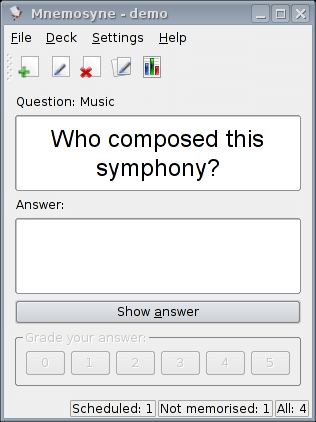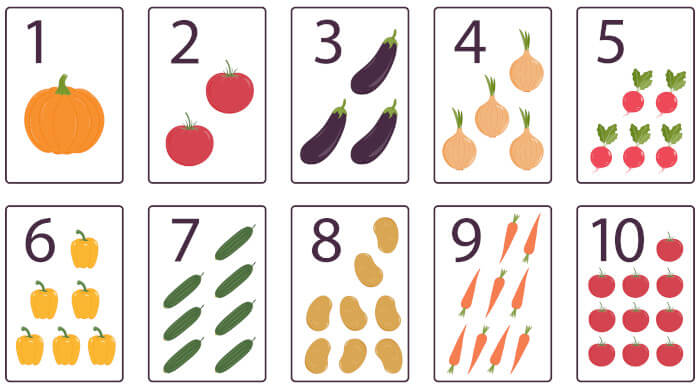Mnemosyne software resembles a traditional flash-card program to help you memorise question/answer pairs, but with an important twist: it uses a sophisticated algorithm to schedule the best time for an item to come up for review. Difficult items that you tend to forget quickly will be scheduled more often, while Mnemosyne won’t waste your time on things you remember well.
Each day, the software displays each card that is scheduled for repetition. The user then grades their recollection of the card’s answer on a scale of 0-5. The software then schedules the next repetition of the card in accordance with the user’s rating of that particular card and the database of cards as a whole. This produces an active, rather than passive, review process.
This spaced repetition system is written in Python.
Features include:
- Clean and simple user interface.
- Efficient scheduling algorithm.
- Support for languages using different scripts through Unicode.
- Support for pictures, sounds and HTML formatting.
- Integrated with LaTeX to display mathematical formulas.
- Support for three-sided cards, e.g. foreign words where you are interested in written form, pronunciation and translation.
- Display statistical info on your learning process.
- Keeps a detailed record of your entire learning process for analysis.
- Your cards can be organised in categories, which can be activated and deactivated to control your learning process.
- Fully customisable for advanced users through configuration files and plugins.
- Available in several languages including French, Germany, Italian, Japanese and Turkish.
- Support for a large number of import and export formats (text, XML, Supermemo, Memaid, …).
- Can be installed on a USB key.
Website: mnemosyne-proj.org
Support: Documentation
Developer: Peter Bienstman
License: GNU General Public License v2.0

Learn Python with our recommended free books and free tutorials.
| Popular series | |
|---|---|
| The largest compilation of the best free and open source software in the universe. Each article is supplied with a legendary ratings chart helping you to make informed decisions. | |
| Hundreds of in-depth reviews offering our unbiased and expert opinion on software. We offer helpful and impartial information. | |
| The Big List of Active Linux Distros is a large compilation of actively developed Linux distributions. | |
| Replace proprietary software with open source alternatives: Google, Microsoft, Apple, Adobe, IBM, Autodesk, Oracle, Atlassian, Corel, Cisco, Intuit, SAS, Progress, Salesforce, and Citrix | |
| Awesome Free Linux Games Tools showcases a series of tools that making gaming on Linux a more pleasurable experience. This is a new series. | |
| Machine Learning explores practical applications of machine learning and deep learning from a Linux perspective. We've written reviews of more than 40 self-hosted apps. All are free and open source. | |
| New to Linux? Read our Linux for Starters series. We start right at the basics and teach you everything you need to know to get started with Linux. | |
| Alternatives to popular CLI tools showcases essential tools that are modern replacements for core Linux utilities. | |
| Essential Linux system tools focuses on small, indispensable utilities, useful for system administrators as well as regular users. | |
| Linux utilities to maximise your productivity. Small, indispensable tools, useful for anyone running a Linux machine. | |
| Surveys popular streaming services from a Linux perspective: Amazon Music Unlimited, Myuzi, Spotify, Deezer, Tidal. | |
| Saving Money with Linux looks at how you can reduce your energy bills running Linux. | |
| Home computers became commonplace in the 1980s. Emulate home computers including the Commodore 64, Amiga, Atari ST, ZX81, Amstrad CPC, and ZX Spectrum. | |
| Now and Then examines how promising open source software fared over the years. It can be a bumpy ride. | |
| Linux at Home looks at a range of home activities where Linux can play its part, making the most of our time at home, keeping active and engaged. | |
| Linux Candy reveals the lighter side of Linux. Have some fun and escape from the daily drudgery. | |
| Getting Started with Docker helps you master Docker, a set of platform as a service products that delivers software in packages called containers. | |
| Best Free Android Apps. We showcase free Android apps that are definitely worth downloading. There's a strict eligibility criteria for inclusion in this series. | |
| These best free books accelerate your learning of every programming language. Learn a new language today! | |
| These free tutorials offer the perfect tonic to our free programming books series. | |
| Linux Around The World showcases usergroups that are relevant to Linux enthusiasts. Great ways to meet up with fellow enthusiasts. | |
| Stars and Stripes is an occasional series looking at the impact of Linux in the USA. | |
